
Māori, or te reo Māori, commonly shortened to te reo, is an Eastern Polynesian language and the language of the Māori people, the indigenous population of mainland New Zealand. A member of the Austronesian language family, it is related to Cook Islands Māori, Tuamotuan, and Tahitian. The Maori Language Act 1987 gave the language recognition as one of New Zealand's official languages. There are regional dialects. Prior to contact with Europeans, Māori lacked a written language or script. Written Māori now uses the Latin script, which was adopted and the spelling standardised by Northern Māori in collaboration with English Protestant clergy in the 19th century.
In the education system of New Zealand, a wānanga is a publicly-owned tertiary institution that provides education in a Māori cultural context. Section 162 of the New Zealand Education Act of 1989 specifies that wānanga resemble mainstream universities in many ways but expects them to be:
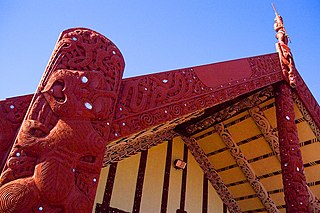
Māori culture is the customs, cultural practices, and beliefs of the indigenous Māori people of New Zealand. It originated from, and is still part of, Eastern Polynesian culture. Māori culture forms a distinctive part of New Zealand culture and, due to a large diaspora and the incorporation of Māori motifs into popular culture, it is found throughout the world. Within Māoridom, and to a lesser extent throughout New Zealand as a whole, the word Māoritanga is often used as an approximate synonym for Māori culture, the Māori-language suffix -tanga being roughly equivalent to the qualitative noun-ending -ness in English. Māoritanga has also been translated as "[a] Māori way of life." The term kaupapa, meaning the guiding beliefs and principles which act as a base or foundation for behaviour, is also widely used to refer to Māori cultural values.
Taonga or taoka is a Māori-language word that refers to a treasured possession in Māori culture. It lacks a direct translation into English, making its use in the Treaty of Waitangi significant. The current definition differs from the historical one, noted by Hongi Hika as "property procured by the spear" [one could understand this as war booty or defended property] and is now interpreted to mean a wide range of both tangible and intangible possessions, especially items of historical cultural significance.
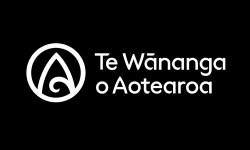
Te Wānanga o Aotearoa is an indigenous tertiary education provider with over 80 campuses throughout New Zealand. As a Māori-led organisation grounded in Māori values, Te Wānanga o Aotearoa is committed to the revitalisation of Māori cultural knowledge. It is also focused on breaking inter-generational cycles of non-participation in tertiary education to reduce poverty and eliminate associated social issues. The organisation works towards "whānau transformation through education".

Kaa Kataraina Kathleen Williams is a New Zealand television presenter on Māori Television on the show Manu Rere.

Kura Te Waru Rewiri is a New Zealand artist, academic and educator. Art historian Deidre Brown described her as "one of Aotearoa, New Zealand's most celebrated Māori women artists."
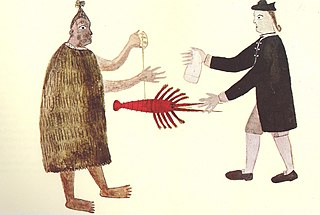
The development of state schooling in New Zealand has been shaped by social, economic and political interactions between Māori as tangata whenua, missionaries, settlers, voluntary organisations and the state of New Zealand which assumed a full legislative role in education in 1852. While the initiatives and systems were driven by colonial ambitions to protect and civilise the indigenous people through assimilation, and install a model of education based on European concepts of the purposes and delivery of learning, Māori actively engaged with the process to retain their traditional knowledge and language by participating in missions schools, contesting many aspects of Native schools and establishing Kura Kaupapa Māori. Arguably to create and reform an education system that aimed to reduce inequalities and enable social mobility, a series of acts of parliament has attempted to resolve differences between competing interests as the country faced social, cultural and economic challenges. In response to criticism of the education system and the role of the state in managing and delivering equitable learning, there were radical reforms in the late 1980s. These changes resulted in the establishment of self-managing schools and a decentralisation of the system, with the Department of Education being replaced by the Ministry of Education whose role has been to implement government reforms. While these systems are under review, they remain in place as of 2023.

Kura kaupapa Māori are Māori-language immersion schools in New Zealand, where the philosophy and practice reflect Māori cultural values with the aim of revitalising Māori language, knowledge and culture. Kura kaupapa Māori are established under the Education Act (1989). The term kaupapa Māori is used by Māori to mean any particular plan of action created by Māori to express Māori aspirations, values and principles.
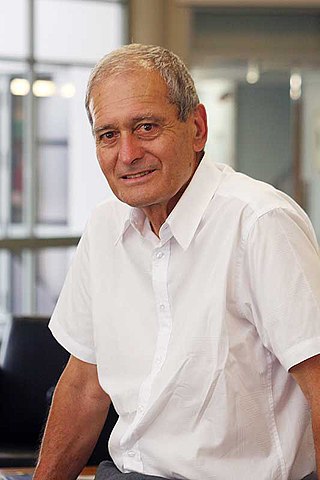
Sir Mason Harold Durie is a New Zealand professor of Māori Studies and research academic at Massey University. He is known for his contributions to Māori health. In 2020, he was appointed to the Order of New Zealand, the highest honour in New Zealand's royal honours system.

Sir "Sidney" Hirini Moko Haerewa Mead is a New Zealand anthropologist, historian, artist, teacher, writer and prominent Māori leader. Initially training as a teacher and artist, Mead taught in many schools in the East Coast and Bay of Plenty regions, and later served as principal of several schools. After earning his PhD in 1968, he taught anthropology in several universities abroad. He returned to New Zealand in 1977 and established the first Māori studies department in the country. Mead later became a prominent Māori advocate and leader, acting in negotiations on behalf of several tribes and sitting on numerous advisory boards. He has also written extensively on Māori culture. He is currently the chair of the council of Te Whare Wānanga o Awanuiārangi.

Linda Tuhiwai Te Rina Smith, previously a professor of indigenous education at the University of Waikato in Hamilton, New Zealand, is now Distinguished Professor at Te Whare Wānanga o Awanuiārangi. Smith's academic contribution is about decolonising knowledge and systems. The Royal Society Te Apārangi describes Smith’s influence on education as creating "intellectual spaces for students and researchers to embrace their identities and transcend dominant narratives".
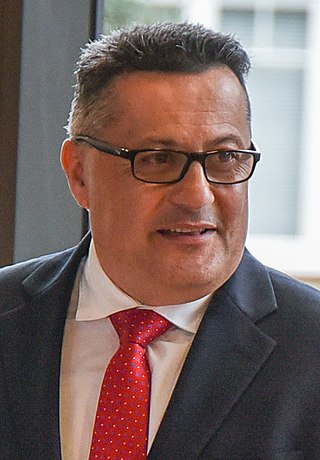
Wiremu Doherty is a New Zealand Māori educationalist and academic of Tūhoe and Ngāti Awa descent. He is the past-principal of the first kaupapa Māori school. He received his PhD in education from the Auckland University in 2010 and is currently a professor at Te Whare Wānanga o Awanuiārangi and chair of the Māori strategy committee for New Zealand Qualifications Authority.

Ngahuia Te Awekotuku is a New Zealand academic specialising in Māori cultural issues and a lesbian activist. In 1972, she was famously denied a visa to visit the United States on the basis of her sexuality.
Star Gossage is a New Zealand painter. In addition to painting, her practice includes theatre, film-making, poetry, and sculpture. While referencing European movements such as expressionism, impressionism and surrealism, her work incorporates Māori concepts such as whānau and whakapapa.

Nigel John Floyd Borell is a New Zealand Māori artist, museum curator, and Māori art advocate. He curated the exhibition Toi Tū Toi Ora: Contemporary Māori Art at the Auckland Art Gallery Toi o Tāmaki in 2020, the largest exhibition since they opened. In 2021 the Art Foundation of New Zealand created an award to acknowledge the work of Borrell in this exhibition.
Ngā Pae o te Māramatanga (NPM) is New Zealand's Māori Centre of Research Excellence (CoRE). It was established in 2002 and is hosted by the University of Auckland with 21 research partners and is funded, like other CoRE's, by the Tertiary Education Commission. The mission was to conduct research for, with and by Māori communities which leads to transformation and positive change.
Kura Paul-Burke is a New Zealand Māori marine scientist, and is the first woman Māori professor of marine science at the University of Waikato. Her research focuses on mātauranga Māori and aquaculture.
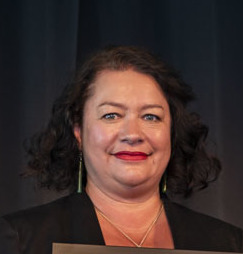
Ngarino Ellis is a New Zealand academic and author. She is one of only a few in her field of Māori art history and an educator. She is an associate professor at the University of Auckland. Her first book published in 2016 is titled A Whakapapa of Tradition: One Hundred Years of Ngāti Porou Carving 1830-1930 with photography by Natalie Robertson.
Annemarie Gillies is a New Zealand Māori academic, and is Professor of Māori Research at the Eastern Institute of Technology in Hawke's Bay. She was formerly a professor at Massey University.














